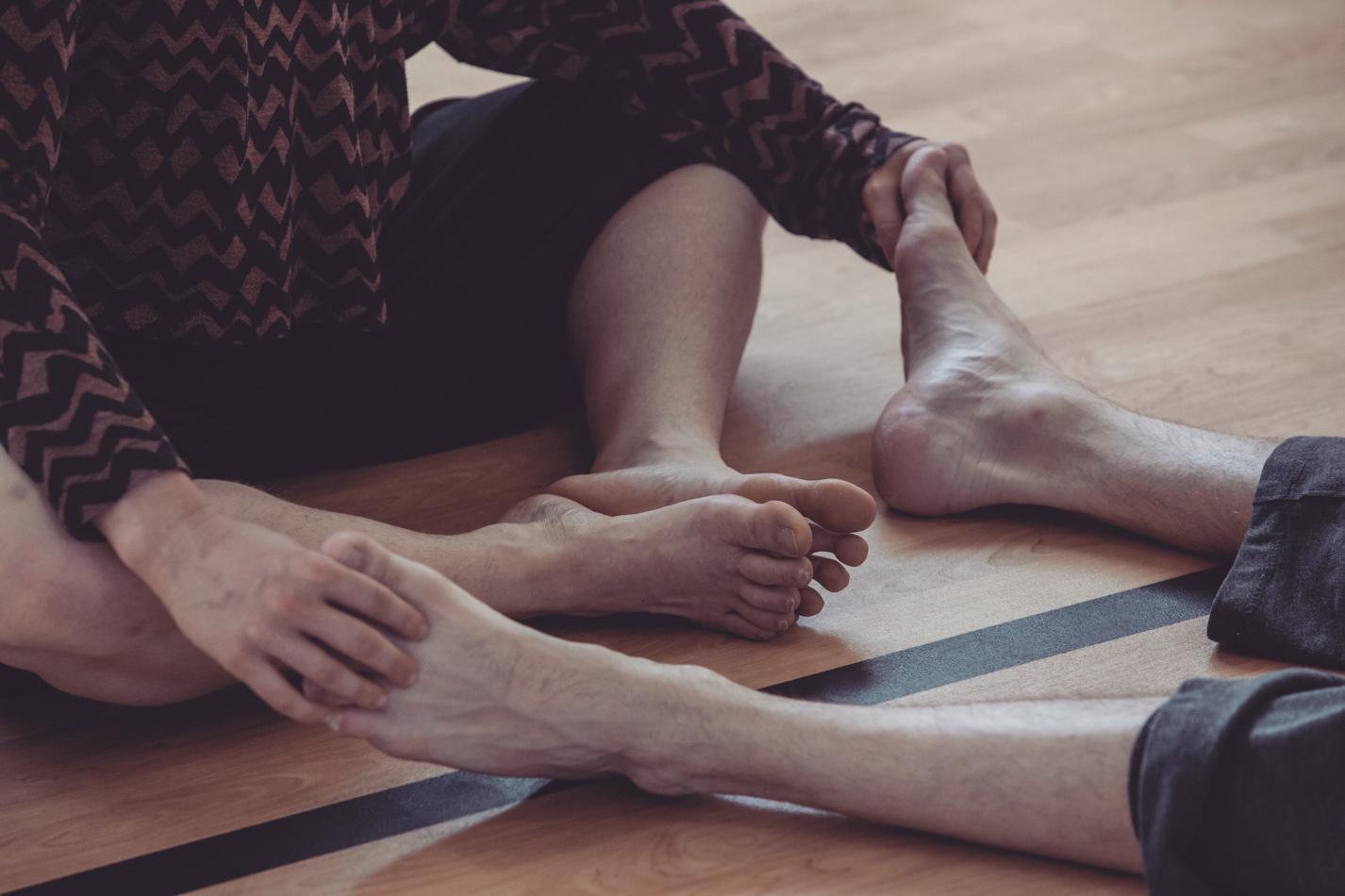Cultivating Body Democracy in Contact Improvisation


Agata Cedro
‘’Methinks that the moment my legs begin to move, my thoughts begin to flow, as if I had given vent to the stream at the lower end and consequently new fountains flowed into it at the upper.’’
Thoreau's Journal: 19-Aug-1851
In today's fast-paced and interconnected, yet increasingly divided world, the practice of Contact Improvisation offers a valuable antidote to many of the challenges people face. It provides a space for individuals to reconnect with themselves, with others, and with the natural world, fostering a sense of wholeness and empathy. As a powerful somatic tool and practice, it has the potential to address the disconnections that often plague modern societies.

Especially in today's world dominated by screens and digital interactions, Contact Improvisation offers a tangible and embodied experience that helps us reawaken our senses, reconnect with our physicality, and listen to the wisdom of our bodies. Through its emphasis on physical touch, shared weight, and spontaneous movement, the practice of Contact Improvisation allows us to reestablish a deep connection with our own bodies while creating a unique opportunity to reconnect with others on a profound level.

2
In a time when divisions and conflicts appear prevalent, Contact Improvisation can serve as a unifying force, transcending cultural, social, and personal differences. Engaging in the dance dialogue with our contact partner teaches us non-verbal communication, trust-building, and respecting each other's boundaries. This fosters empathy, compassion, and an appreciation for the importance of cooperation and collaboration. Developing these soft skills is crucial not only for personal growth but also for guiding humanity toward a more positive direction and ensuring the success of businesses.
The practice also deepens our connection with nature. As we engage in the dance, we tap into the principles of momentum, gravity, and the interplay between our bodies and the Earth. We soon become more attuned to the natural forces that surround us, gaining a greater appreciation for the interconnectedness of all living things. This awareness inspires a sense of stewardship and care for the environment, encouraging sustainable and harmonious relationships with nature.
Beyond the physical

As we could see by now, Contact Improvisation is not merely a physical endeavor; it is a form of embodied learning, that catalyzes transformative growth on multiple fronts: through the physical exploration of movement and touch, we absorb and internalize fundamental principles such as consent, cooperation, adaptability, and respect. These principles extend beyond the dance floor and permeate our daily lives, influencing the way we relate to others, navigate challenges, and create inclusive communities.
Now that we've briefly explored Contact Improvisation's broader essence as a path to connection and unity, let's dive deeper into one of its fundamental concepts: body democracy.
3
Defining Body Democracy within CI practice

In the world of Contact Improvisation, the concept of Body Democracy is a guiding principle that fosters inclusivity, equality, and respect for every individual's body. It creates an environment where all bodies are valued, honored, and given equal agency within the dance.

4
By applying the principle of Body Democracy, we embrace the rich diversity of bodies, abilities, and experiences present in the Contact Improvisation Community. This challenges our societal norms and expectations related to beauty, body size, age, gender, and physical ability, allowing individuals to move and express themselves freely without fear of judgment or discrimination.
We aim to promote consent, clear communication, and the establishment of personal boundaries, creating a space where participants can explore movement authentically and without hierarchy. Our focus is on collaboration rather than competition, enabling dancers to listen, respond to each other's movements, and share weight and decisionmaking equally.
In Contact Improvisation, Body Democracy mindset also empowers movers to make choices that feel genuine and comfortable to them, cultivating a sense of selfexpression and self-determination. It encourages deep body awareness, fostering a greater appreciation for the diverse experiences and qualities within the dance.

And how does this translate into our everyday lives?
Beyond the dance itself, Body Democracy extends to broader social and cultural contexts, by challenging biases and inequalities that limit individual agency and expression. The practice of Contact Improvisation provides a platform for inclusivity, empowerment, and social change, inviting participants to reclaim ownership of their bodies and engage in a collective exploration of movement and connection It advocates for active embodiment, emphasizing practical application over mere philosophical contemplation. It creates a welcoming and supportive environment, where everyone is encouraged to embrace their uniqueness, share their perspectives, and contribute to the transformative power of movement.
Before delving further into the community aspects and engaging in discussions about global issues, let's pause to reflect on one 'microscale' question:
Can a single body embody the concept of body democracy?
My response to it is: It should, for it all begins with us. However, I encourage you to find your own answer.
5
To embrace the concept of bodily democracy on a broader scale, we must first internalize it ourselves. This entails welcoming all spontaneous physical and emotional sensations to arise within our own space without prejudice. This is where somatic practices come into play. They assist us in unraveling patterns of perception and physicality that hinder our ability to stay in the present moment with openness, curiosity, and acceptance, as opposed to judgment and fear.
Whether we choose to follow our impulses or simply bear witness to their appearance, persistence, and eventual dissolution, acknowledgment is the key ingredient in this process. For a moment, we allow these phenomena to 'dance' freely in our inner space, to touch us, and to enrich us without judgment, granting them an equal right to exist. In doing so, we learn to maintain our integrity, embodying the concept of democracy within ourselves. Only by nurturing the process of integrity within ourselves can we then take the next step and embrace the concept of integrity and democracy within our societies.
I truly love Rumi's words, which resonate so powerfully in this context:
‘’Out beyond ideas of wrongdoing and rightdoing there is a field. I'll meet you there. ‘’


6
The slippery sloap to anarchy?
Can practicing impartial acknowledgment lead to anarchy rather than democracy, blurring the differentiation between right and wrong and erasing rules and principles?

My personal life experience has taught me that there is an innate wisdom in our bodies that precedes thought and spoken words, naturally guiding us toward nurturing life in all its forms. It's worth pausing to reflect on whether such questions, if they arise, reflect our disconnection from this inner guidance. The fewer connections we have to it, the more likely we are to seek refuge in mental rules and concepts that build walls instead of bridges.
To hear our inner voice, we must first loosen our grip on preconceptions and rigid ideas about ourselves and the world around us. Contact Improvisation, as well as other somatic practices, inspire us to do so. They provide us with tangible tools to enrich change and foster transformation.

7
In summary, the practice of Contact Improvisation holds profound practical implications for both individuals and society as a whole. It offers us an abundance of joy and exciting adventures while also encompassing many more rewarding aspects waiting to be discovered.
Next, I will delve deeper into the various potential outcomes and benefits of this multi-layered practice, revealing how it can be particularly relevant for those of you in the business world leaders, teams, and professionals working in sectors that may, at first, seem unrelated to movement. These outcomes and benefits include:
• enhanced communication and conflict resolution skills
• leadership and collaboration development

• heightened creativity and productivity
• promoting strong sense of community
• nurturing empathy and compassion
• fostering inclusivity and diversity
• sustainability and environmental consciousness
• body positivity
• improved physical and mental well-being
• personal growth and artistic expression
Stay tuned for a deeper dive into these transformative dimensions of somatic practices. In the meantime, I would like to encourage you to take the opportunity to follow the wonderful advice of my mentor, Bonnie Bainbridge Cohen:
‘‘Feel it in your body and get it out of your brain and frontal lobe.‘‘
8








